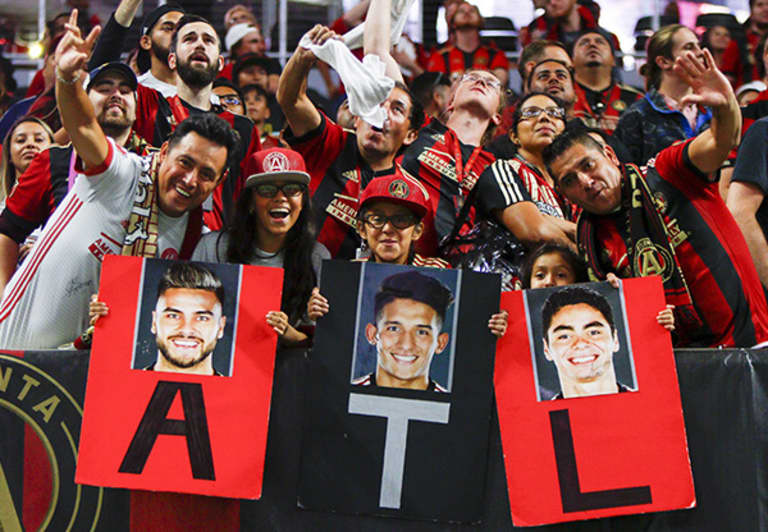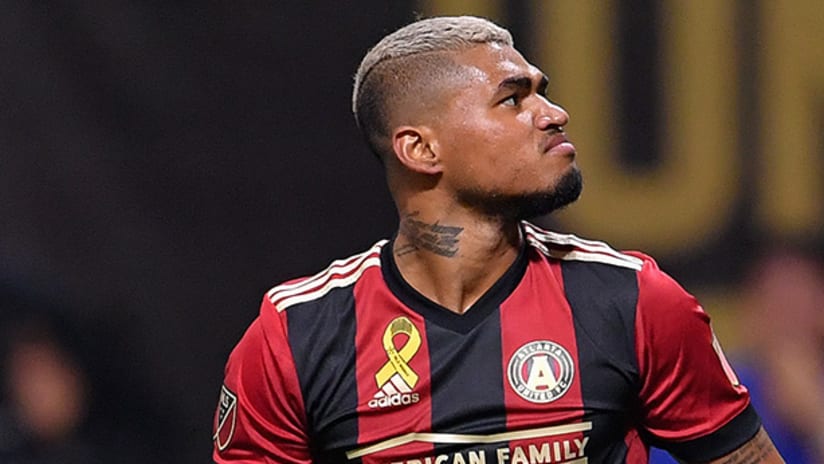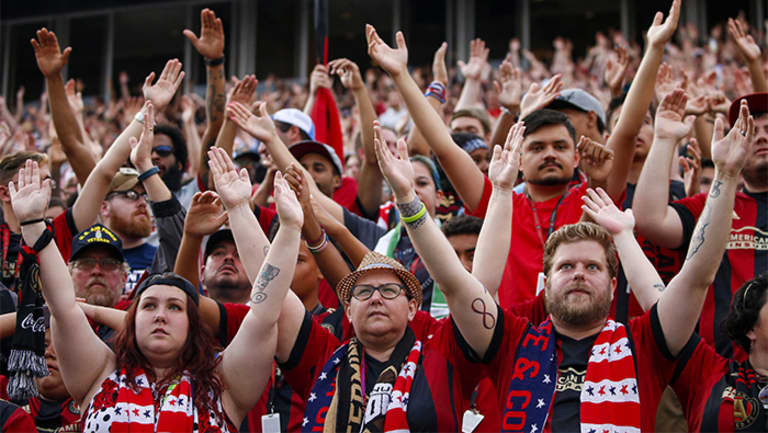
The largest crowd ever for an MLS match. A per-game attendance mark that will soon smash the league record. An entire town swathed in red and black – not for the local NFL team, but for the new soccer club – and a near-ubiquitous crest on shirts, flags, bumper stickers and signs all over town.
Soccerheads around Atlanta will tell you they thought all along that an MLS team would be successful in the ninth-largest market in America. But not even they expected the magnitude with which Atlanta United have knocked the conventional thinking on its butt.
“This has surpassed my expectations by far,” says Atlanta native Walker Zimmerman, whose FC Dallas became the first-ever visiting team at Mercedes-Benz Stadium earlier this month. “I think it’s already one of the best fan bases in MLS.”
So less than a week removed from a crowd of 70,425 and a continuing average draw of nearly 48,000 per home game (more than any NBA, NHL or MLB team), let’s ask the question that’s on everyone’s minds: How on earth did we all miss the signs that Atlanta United could be this much of a smash hit in a place that some questioned as being deserving of an expansion team in the first place?
The simple answer is that there is no one answer. There are only theories. But piece them together and you’ve got a fun look at how the league hit a home run in the ATL.
Theory 1: It's an exciting team any city can get behind
This is the easiest one to explain.
Every new club in MLS has done well at the gates in its first year (even Chivas USA!), so an initial pop in interest was to be expected. The 55,297 in attendance at Atlanta United’s first home match at Bobby Dodd Stadium back in March wasn’t a huge surprise, especially given that Atlanta had seen crowds of that size and bigger at several international friendlies at the Georgia Dome over the past eight years.
But this is where the club deserves huge credit for its unique roster-building strategy. Yes, it’s deep-pocketed thanks to billionaire owner Arthur Blank. But the technical staff didn’t follow the common expansion blueprint of stocking the squad with recycled MLS veterans and aging, big-name Designated Players to fill the seats. Instead, they aggressively pursued young, in-demand talent from South America to build out a lethal attack alongside domestically cultivated players.
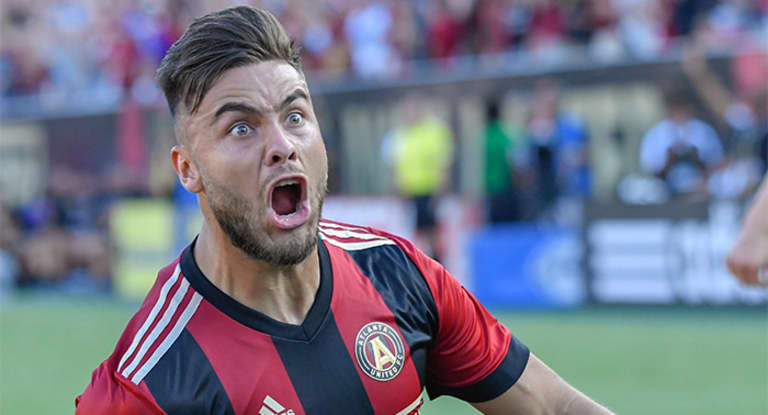
The result: the universal language of goals. Josef Martínez, Miguel Almirón, Yamil Asad and Héctor Villalba (above) have, between them, 43 goals and 41 assists – both figures that are the best of any quartet in MLS. Meanwhile, the Five Stripes are second in the league in goals per game and have scored four or more on six occasions – including last week’s 7-0 beatdown of New England and, on Wednesday night, a 4-0 embarrassment of the five-time MLS Cup champion LA Galaxy.
Whether you’re new to the game or a longtime fan, Atlanta’s aggressive style of play is a thing to behold, and it’s not hard to get excited when you’re fully confident your team has the ability to deposit a half-dozen goals in any given game. They’re also competitive in the standings, and look like a lock to become just the third team in MLS’s expansion era to qualify for the playoffs in their first season. There’s excitement and buzz about this team.
“Frankly,” says Atlanta Journal-Constitution soccer writer Doug Roberson, “it’s hard to figure out one misstep the team has made.”
Theory 2: The Blank effect is in full effect
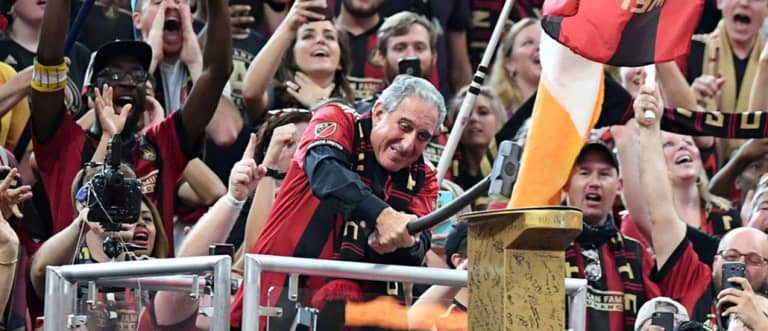
The day Atlanta was officially announced as an MLS expansion city in 2014, mayor Kasim Reed joked, "When Atlanta needs help, the red phone in the mayor's office goes to Arthur Blank.” It wasn’t a joke.
MLS clubs have all manners of ownership structures, from single owners to consortiums to fully corporate entities, and everything in between. Atlanta United has one owner: Blank. His name carries weight in Atlanta in a way that demands respect. Blank, of course, made his fortune as co-founder of the Home Depot and endeared himself to Atlanta by putting his money where his mouth is, whether it’s investing in the community or through philanthropic efforts.
When he purchased the Falcons in 2001, he transformed a regular doormat of an NFL team that had never even experienced back-to-back winning seasons into a perennial contender – and even when they weren’t making the playoffs, they still generated a sense of local pride that had eluded the team throughout most of its history.
“Blank made [the Falcons] competitive,” explains local soccer personality Jason Longshore, who wrote this passionate essay about United’s first game at Mercedes-Benz Stadium. “He stressed he would put a good product on the field. No one would question that would be the exact approach he’d bring to a soccer team. If it wasn’t Arthur Blank, it wouldn’t have worked.”
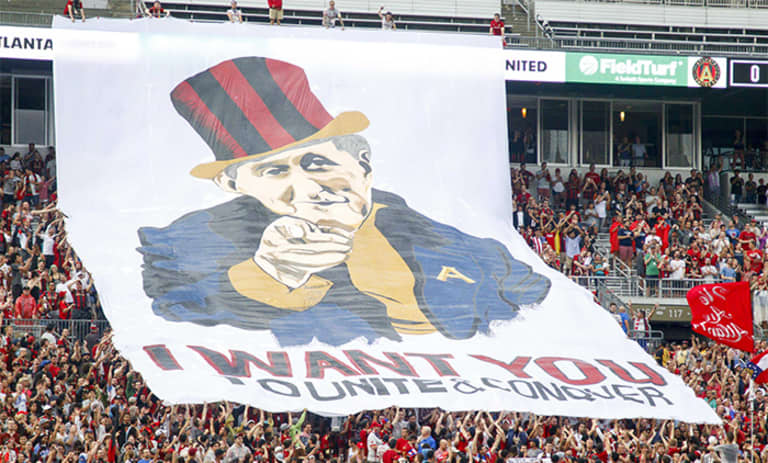
No, Blank isn’t a soccer guy. Like many MLS owners, he talks about how his kids play and that’s what got him excited. But as the sole owner of Atlanta United, the buck stops with him. And instead of making the mistake of trying to run a soccer club like his NFL property, he surrounded himself with smart soccer people to build the club the right way, like former Tottenham Hotspur exec Darren Eales as president, former US national team captain Carlos Bocanegra as technical director and former Orlando City exec Paul McDonough as director of soccer operations. And they in turn landed perhaps the biggest coup in former Argentina manager Tata Martino as Atlanta’s first head coach.
That braintrust has created the latest reason for Blank to be universally beloved in his city. And even if his teams don't hit at a 100 percent success rate, they don’t call him “Uncle Arthur” for nothing.
Theory 3: This is a new team for a new Atlanta
Most major cities in the United States and Canada are undergoing urban renaissances, with widespread gentrification and massive increases in real estate value bringing millennials (and their young families) into the the core of cities. MLS teams are trying to take advantage of this trend, which is why they concentrate new stadium projects on downtown sites. Atlanta is no different, which is a huge reason why the league chose it as an expansion city.
But Atlanta is somewhat distinct in that it continues to be a city of transplants. According to census data, 37 percent of Metro Atlanta residents are from outside Georgia, and there is evidence that suggests Metro Atlanta is a top destination for relocation thanks to the relatively cheaper cost of living and the presence of 16 Fortune 500 companies.
Local entrepreneur and United season ticket holder Michael Tavani theorizes that with so many transplants, it’s harder to find huge pockets of support for Atlanta’s teams. United is the first major-league team to set up shop in the area in 20 years (the last one, the NHL’s Thrashers, left town in 2011). And for the latest wave of transplants, United represents a chance to be part of something that isn’t just new, it’s uniquely theirs.
“When people move here, they bring their old teams,” Tavani says. “When you go to Hawks games, it’s crazy how many jerseys you see for the other team. But MLS is young and most fans don’t carry the legacy of another team. With soccer, it’s a bit of a blank slate. This is the first team in Atlanta where people can rally behind it and we all feel like we joined at the same time.”
Theory 4: This is the perfect storm of things going right
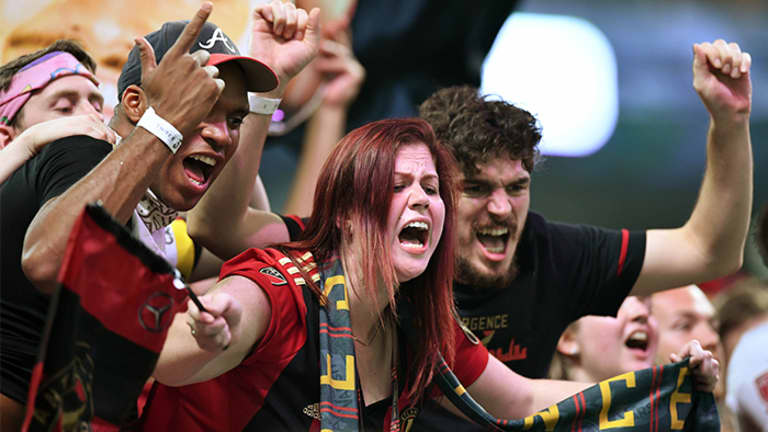
Even if all three of the above theories hold water, it’s entirely possible that they couldn’t stand on their own.
Sometimes, success is all about timing. If the Braves hadn’t moved out of downtown Atlanta to their new stadium in suburban Cobb County starting this year, would fans have chosen baseball over soccer?
If United don’t score 10 goals in two games early in the season – including a nationally televised spectacle of a 6-1 smashing at fellow MLS debutants Minnesota United in a whiteout blizzard – would the excitement have been just a little less?
If the ball takes a few different bounces and United finish 2017 as an entertaining, but non playoff-bound team, does that soften the buzz a tiny bit?
It’s hard to say. There is absolutely a feeling that the planets have aligned for Atlanta United in their first season. The bigger challenge is yet to come. As Roberson says, “It’s only Year 1. Let’s see what happens if things change.”
But for the time being, they are the “IT” thing in the ATL. And they’re making a lot of us eat crow.
Jonah Freedman is a long-time soccer journalist and the first managing editor at MLSsoccer.com. A former senior editor at SI.com, he has also managed content for other brands, including StubHub and Under Armour.
